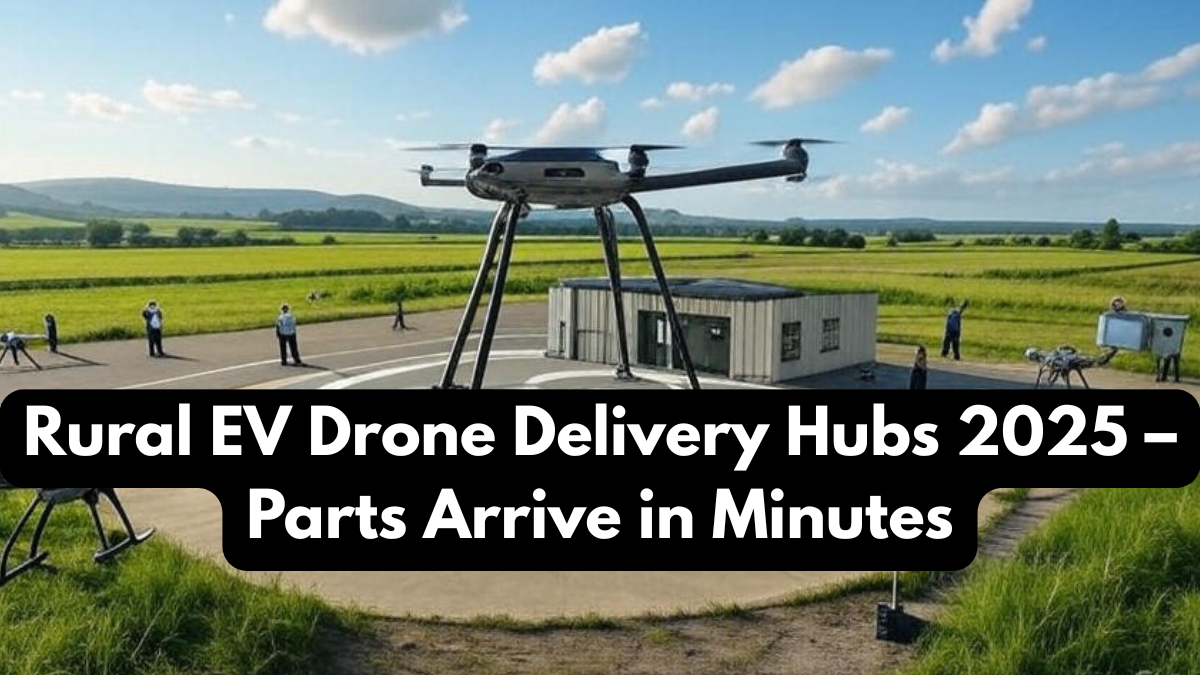In 2025, innovation is landing in the heart of villages with the rise of Rural EV Drone Hubs. Designed to solve the long-standing problem of delayed spare parts in rural areas, these hubs are revolutionizing logistics. Instead of waiting days or weeks for essential auto components, residents can now receive them within minutes. This advancement is a critical step in streamlining Auto Spare Delivery, ensuring that even the remotest villages stay connected to the automotive service ecosystem.
The idea is simple but transformative: use electric drones to deliver auto parts quickly, sustainably, and at lower costs. These hubs are not just about technology—they represent inclusion, bridging the urban-rural gap in access to essential vehicle services.

How Rural EV Drone Hubs Work
The Rural EV Drone Hubs function as centralized points where auto spare parts are stored, sorted, and dispatched. Drones, powered by electric batteries, carry packages directly to local garages or individuals. Using GPS navigation, real-time weather monitoring, and automated landing systems, these drones ensure accurate and safe Auto Spare Delivery.
Key features include:
- Solar-powered charging stations for drones
- Centralized rural warehouses for spare parts
- AI-based scheduling for faster dispatches
- Partnerships with local mechanics and auto shops
- Cost-effective and eco-friendly logistics
Advantages of Auto Spare Delivery with Drones
Traditional supply chains often struggle in rural areas due to poor road infrastructure and limited courier services. The Rural EV Drone Hubs provide a direct solution. By relying on drones, villages no longer face delays that can paralyze transport and livelihoods.
Here’s a comparison to show the difference:
Feature |
Traditional Delivery Methods |
Rural EV Drone Hubs 2025 |
|---|---|---|
Delivery speed |
2–7 days in rural areas |
Within minutes to hours |
Environmental impact |
Fuel-based transport |
Zero-emission electric drones |
Accessibility |
Limited by poor roads |
Can fly directly to remote villages |
Cost efficiency |
High logistics costs |
Lower operational expenses |
Reliability |
Dependent on weather and roads |
AI-guided with real-time monitoring |
Why Rural EV Drone Hubs Are Essential
Vehicle downtime in rural areas can affect livelihoods, especially when autos, tractors, or two-wheelers are essential for work and transportation. With Auto Spare Delivery through drone hubs, mechanics can fix vehicles faster, ensuring uninterrupted daily life.
The project also boosts rural economies by:
- Reducing losses from transport delays
- Supporting local repair shops with immediate access to spares
- Increasing mobility for farmers, workers, and families
- Creating new jobs in drone operation and hub management
The 2025 Rollout
The Rural EV Drone Hubs are being launched as part of a wider initiative to modernize logistics in India. Pilot projects are already running in states with challenging terrain, such as the Northeast and Himalayan regions. By 2025, expansion into thousands of villages is expected.
The integration with Auto Spare Delivery companies ensures long-term sustainability. Partnerships with manufacturers mean spare parts are directly stocked in hubs, reducing dependency on distant warehouses. Over time, this system may expand to other sectors like medicines, groceries, and essential supplies.
Conclusion
The Rural EV Drone Hubs project represents more than technological progress—it symbolizes equality in access. By combining drone technology with Auto Spare Delivery, rural communities no longer face the frustration of delayed services. In 2025, these hubs are poised to transform the way villages function, offering speed, sustainability, and empowerment.
FAQs
What are Rural EV Drone Hubs?
They are centralized rural warehouses where drones are used to deliver auto spare parts quickly and efficiently.
How does Auto Spare Delivery benefit from drones?
It allows parts to reach villages in minutes rather than days, reducing vehicle downtime and improving repair services.
Are these drones eco-friendly?
Yes, the drones are electric-powered and often recharged using solar-powered stations, making them sustainable.
Will Rural EV Drone Hubs create jobs?
Yes, new roles in drone operation, hub management, and logistics coordination will open up in rural communities.
Can these hubs deliver items other than auto spares?
While designed for Auto Spare Delivery, the system can later expand to medicines, groceries, and essential goods.
Click here to learn more